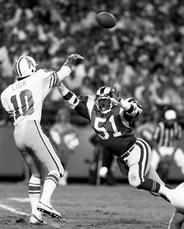By Jim Gehman | Engagement Insider
 A quarterback out of West Virginia University, you were drafted by the Houston Oilers in 1982. And to be honest, the team didn’t really enjoy a lot of success during the mid-1980s. Nevertheless, what’s one of your fondest memories from those days?
A quarterback out of West Virginia University, you were drafted by the Houston Oilers in 1982. And to be honest, the team didn’t really enjoy a lot of success during the mid-1980s. Nevertheless, what’s one of your fondest memories from those days?
“Getting to know the great city of Houston. It was a time in the city’s history where there was rampant growth followed by a big oil bust in the mid-‘80s when oil dropped down to $19 a barrel. It was a fascinating time to be there.
“I have fond memories of playing for the Oilers even though we weren’t a very good team. I was able to start a handful of games and win a couple. And get to know great players like Warren Moon or Archie Manning or Earl Campbell.
“I also was very aware of my skill set, which was really that of a backup. I really enjoyed the opportunity to play. It’s a special opportunity to play in the NFL regardless of what your skill level may be.”
After spending five seasons with the Oilers, you went on to earn a law degree, and work for various companies including the NFL as the VP of Business Development and the President of NFL Europe.
In 2010, you returned to West Virginia University to become the athletic director. And just recently, you’ve accepted a position with the NCAA as the executive VP of regulatory affairs. What will your duties be?
“This is a new position. Technically, it oversees three of the divisions, if you will, of the NCAA: enforcement; academic and membership affairs, which is really all the legislation; and the Eligibility Center, which is as the name sounds. It’s the group that makes sure professionals aren’t playing amateur sports. I will oversee those three divisions, but certainly a lot more will come out of that because of the change that’s happening.”
What attracted you to accept the job?
“Well, I’m a big believer in intercollegiate athletics. I think there’s a lot of good that goes on with the over 400,000 student-athletes. That includes all the sports, Division I, II and III. There are a lot of small Division III schools that folks sometimes forget about, but those kids are working hard and having fun playing volleyball, football, swimming, whatever.
“You’ve got great coaches. Kids learning life lessons. There’s a lot of entertaining sports for folks to watch and consume. It shines, usually, a positive light on all these great colleges and universities. But as you know, there are lots of threats to the model. The model probably has to change somewhat if not significantly. So just the opportunity to help affect change at a national level with an organization for which I’ve always had a lot of respect.”
The NCAA is headquartered in Indianapolis. Your son, Andrew, already makes his home there and is doing pretty well as the Pro Bowl quarterback of the Colts. He should be able to put you and your wife, Kathy, up until you find a place.
“He’ll let me sleep in his garage for a while. [Laughs] That’s an added bonus. It’s always important to be near family.”
What does it mean to you that you and Andrew reached the goal of playing in the NFL?
“We never raised him with the idea that one day you could play in the NFL; follow in his old man’s footsteps. We tried to raise all four of the kids with traditional values of work hard, follow your dreams and don’t give up. And make sure you focus on your education because that’s really what matters in today’s world.
“We’re delighted that he has a chance to do what he loves to do, which is play in the NFL. But we never raised him with the idea that the end all and be all was to be an NFL quarterback.”
Given that, what’s the best advice you’ve given him about being an NFL quarterback?
“I was fairly limited with my advice when he was drafted. Only because I think he got incredible advice from [his coaches at Stanford]; Jim Harbaugh, who had a great career of playing in the league, David Shaw, who coached in the league and Pep Hamilton, who coached in the league for years.
“The league is hard. It’s a grind. You can’t fake it. You really have to be yourself. And I think in Andrew’s case, his set of characteristics is really well suited for the NFL. My advice was just to be yourself because you have to trust in yourself to make it through. There will be highs and there will be lows, but as long as you trust in yourself and your skill set, you’ll end up having more highs than lows and end up being successful.”
What’s the best thing about being Oliver Luck?
“I suppose the best thing is that I married a great woman and have four great kids [Andrew, Mary Ellen, Emily and Addison], all of whom are doing well in their respective fields. I’m grateful for that.”